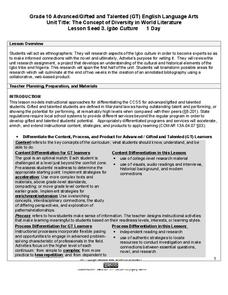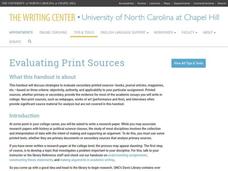Maryland Department of Education
The Concept of Diversity in World Literature Lesson 9: Debating Imperialism
To gain an understanding of Imperialism, class members read Rudyard Kipling's poem, "The White Man's Burden" and Mark Twain's essay, "To the Person Sitting in Darkness." Groups compare these perceptions of non-white cultures with the...
Center for Learning in Action
Introduction to Matter
Begin your states of matter lessons with a demonstration designed to introduce the concept that all matter has properties. Reinforce this concept through vocabulary exploration, and the creation of atom models; salt, water, and carbon...
Curated OER
Time Expressions with Hacer
The verb hacer has many purposes in the Spanish language, one of which is as part of time expressions. Your class can learn how to use hacer in the preterite, present perfect continuous, and past perfect continuous to express different...
Bright Hub Education
How to Outline, Plan & Write a Memoir
Get to know each individual through a memoir project. The lesson outlined here is a bit vague, but has some promising ideas for graphic organizers to help writers prepare their work. In order to succeed with the lesson, you will need to...
Ball State University
Dear Pen Pal
Keep your class in conversation with others across the country or across the sea by writing letters to pen pals. The activity calls for students to be pan pals with pupils in Africa; however, the listed steps could be used for any...
Curated OER
My Foot and the Standard Foot
Young mathematicians put one foot in front of the other as they learn how to measure length in an elementary math lesson. Using paper cutouts of their own feet, children measure classroom objects as they discover the importance of...
Scholastic
What’s the Good Word? Etymology Project Guidelines
Who named the shapes, or the days of the week? Should words be removed from the dictionary if they're no longer commonly used? Are there too many words in the English language? Language arts students explore these and additional...
Baruch College Writing Center
Summarizing, Paraphrasing, and Quoting Workshop
What's the difference between summarizing and paraphrasing? Show class members how to find the main ideas from informational text and condense it, restate it, or quote it directly with a series of educational activities based...
Missouri Department of Elementary
Dealing with Peer Influence: What Are Bullying and Harassment?
Scholars examine examples of peer pressure and discuss how specific actions negatively affect one's well-being. Learners gather in small groups to write two scenarios in which peer pressure is used. They reference the STAR method in how...
Curated OER
The Conditional in Spanish
Under what conditions would your Spanish language learners use the conditional? They can find out here, and practice their new knowledge with the linked exercise. There is information about regular and irregular conditional verbs as well...
Missouri Department of Elementary
Diversity Day
Party time! Here's a resource that suggests celebrating diversity by organizing a school-wide event that features performers and speakers that represent the various cultures and traditions. The packet includes a list of suggested...
Curated OER
Spanish Commands (the Imperative Mood)
It is imperative that your pupils have a strong command of all the Spanish moods, including the one that is the focus of this resource. Learners can read up on formal, informal, affirmative, and negative commands as well as how to use...
Curated OER
Flicking Football Fun
Young mathematicians fold and flick their way to a deeper understanding of statistics with a fun, hands-on math unit. Over the course of four lessons, students use paper footballs to generate data as they learn how to create line...
Maryland Department of Education
The Concept of Diversity in World Literature Lesson 3: Igbo Culture
What cultural concepts must readers understand in order to connect to Things Fall Apart? As part of their study of Chinua Achebe’s novel, class members research Nigeria and the Igbo culture to create a collaborative, web-based,...
Houghton Mifflin Harcourt
Surprise!: English Language Development Lessons (Theme 2)
Surprise! is the theme of this series of ESL lessons. Cover an array of topics such as where we live, different times of day, shapes, the city and the country, what we do for fun, jobs, and games, all while practicing how...
Curated OER
Interactive Student Notebook for Middle School ELA
Encourage creative, independent, and reflective thinking and writing throughout the school year by having your class members keep Interactive Student Notebooks (ISN). Here you'll find a presentation designed to...
Chemistry Collective
Virtual Lab: DNA Binding Problem
Why do the bases in DNA pair up the way they do? Unravel the mystery of the double helix in a virtual lab. Young scientists follow in the footsteps of Watson and Crick to determine the free energy associated with DNA base pair binding....
CC Homestead
Summarize
Designed for third graders but appropriate for older learners as well, this packet of materials underscores the necessity of teaching kids how to summarize, how to identify main ideas and supporting details, and how to ask questions...
Southern Kennebec Child Development Corporation
Sun Blocks: Building a Foundation for Healthy Skin
Here comes the sun! Primary graders engage in activities that teach them how to protect themselves from the effects of UV rays. They learn that each season (fall, winter, spring, and summer) offers its own special challenges so they...
Teach Engineering
Get the Word Out at McDonald's!
To get the word out that the Great Pacific garbage patch (GPGP) contains millions of pounds of non-biodegrading plastics, individuals research the GPGP and write an article for a newsletter. Researchers present their facts in a...
University of North Carolina
Evaluating Print Sources
Not all sources are created equal, so how do you evaluate them? Writers learn how to evaluate print sources based on elements such as audience, tone, and argument in the sixth handout of 24 in the Writing the Paper series from the...
Pulitzer Center
"Voices from Haiti": Using Poetry to Speak up for a Cause
Explore a real world use of poetry with your class! Young language arts pupils consider the concept of advocacy and how journalism, photography, and poetry can raise awareness for a cause. They read several poems about individuals...
Missouri Department of Elementary
My Problem…Your Problem…Our Problem
Encourage sixth graders to take responsibility for their actions and become a problem solver. Pupils discuss new problems faced in sixth grade then identify ones that involve other people. A worksheet guides their practice in conflict...
National Institute of Open Schooling
Mole Concept
Learners explore atomic measurement in the first activity in a series of 36. Through readings, activities, and questions, classes review standard SI units, learn about Avogadro's constant, and use it to help them calculate moles. They...























